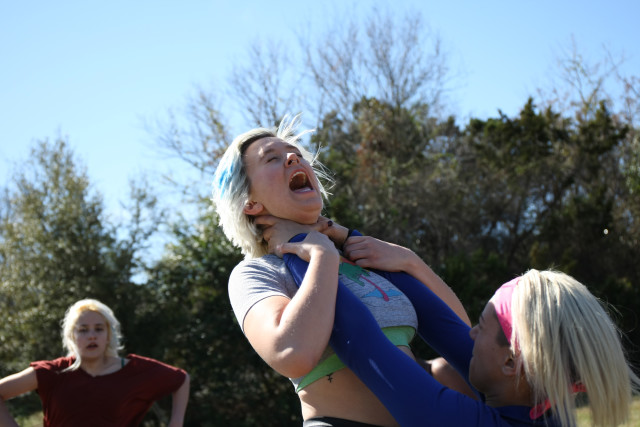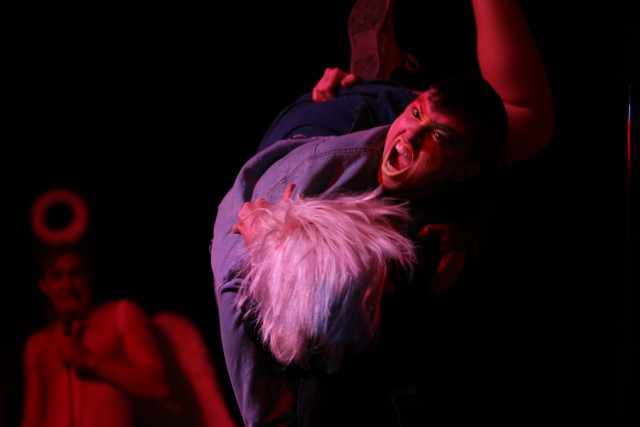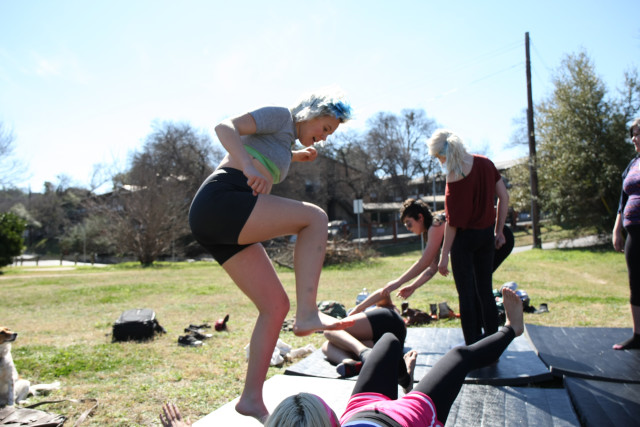The First All-Female Rasslin’ League in Texas Is Getting Ready to Perform
By Emily Gibson
Photography By Daulton Vognar
Reporting Texas

Shelby Bohannon practices getting choked by Jade White at Zilker Park in Austin. Daulton Venglar/Reporting Texas
In a field near Zilker Park, a group of women stand in a circle kicking their friend while she lies on the ground, screaming. The victim shields her torso and screams, “No, not my ovaries!”
This isn’t a scene from a female “Fight Club” or an act of random violence. This is practice for Austin’s all-women theatrical wrestling league, the Glorious Ladies of Rasslin’, Y’all, or GLORY. In some ways, GLORY is the antithesis of wrestling. In place of male-dominated aggressiveness, GLORY takes a theatrical and inclusive route. It’s a radical opening of the sport to people who identify as women from a variety of backgrounds and perspectives.
The idea for the league, which is believed to be the first of its kind in Texas, was sparked last year when founder and wrestler Cheryl Couture, a 33-year-old Austin writer, was drunkenly brainstorming with a friend at a party.
She pitched the idea to her eventual co-creator, Esme East, and the duo began creating the framework for a league where all members identify as women — from performers to the announcers, set designers and the art team.
“We want to see what happens when something is done completely without the input of men,” East, 24, said. “Men tend to be very loud and assertive, and I’ve found that this often means women don’t get their ideas heard.”
GLORY was partly inspired by the Austin co-ed wrestling league Party World Rasslin’, or PWR. Some PWR wrestlers perform with GLORY. Alternative wrestling has been around for years, but PWR got started in Austin in 2013. As PWR hosted more elaborate events, it found a dedicated Austin audience. Its most recent event, on March 12, drew a crowd of 1,400, according to PWR general manager Tim Faust.
“Creating more kinds of safe spaces for more kinds of people is vital,” Faust said. “That [GLORY] may extend the big tent of wrestling fanhood is an added perk for everyone.”

Esme East picks Shelby Bohannon up at a promo performance of “Glory” at Boner Bizarre, a Valentine’s Day variety show. Daulton Venglar/Reporting Texas
On Feb. 13, GLORY wrestlers performed with Boner Bizarre, a troupe of fringe performance artists, in “A Valentine’s Day Massacre,” described on the troupe’s Facebook page as “Austin’s trashiest celebration of love, lust, and blood sacrifice,” at the Midway Field House, a bar on East Riverside Drive. Two GLORY wrestlers interrupted the show’s hosts and hurled insults before throwing fake punches, to background music by English punk band X-Ray Spex.
Hours earlier, during a pre-show run-through, the violence-inciting insults from wrestler Queen Cup sounded a little more measured.
“I’m a mean person, and I’m going to say mean things about this girl who I hate,” she said in rehearsal.
After the run-through, Queen Cup – Shelby Bohannon, a 20-year-old student – and East, her wrestling partner, laughed, high-fived and went to the bar’s second level to practice more. The onstage anger that fuels their performance belies the friendship between the roommates.
“Working together to get strong so you can beat the [expletive] out of each other is a beautiful thing,” Bohannon said.
During a recent practice at Zilker Park, East taught the wrestlers ring skills, including how to stomp on the mat to make a hit sound real, the appropriate time to jerk your head back to make a roundhouse kick to the face look real, and how to grunt like you’re in pain.
“This isn’t about being sexy women or about following any kind of traditional guidelines for female performance,” Bohannon said. “We are doing what we want, getting as weird as we want and not worrying about what is acceptable.”
Alice Geaccone, a 27-year-old fashion designer who performs under the moniker Digital Brat, enjoys the opportunity to transform into an alter ego.
“There is something therapeutic about it,” she said. “I am new to wrestling but see the power of it. The women I see in wrestling are liberated and powerful, and it’s beautiful.”

Shelby Bohannon practices kicking and stomping Jade White at Zilker Park in Austin during a wrestling practice. Daulton Venglar/Reporting Texas
While the all-female league has received support from the area’s theatrical wrestling community, East said she could care less about critics. “Wrestling is a rich and amazing art form, but the culture surrounding pro wrestling is alienating to a lot of wonderful people. It would be cool to make wrestling a more accessible and fun type of entertainment” for audiences beyond white, heterosexual men, she said.
Traditional indie wrestling fans might not support women who aren’t “wrestling in bikinis in oil,” Couture said. But creating GLORY gives the wrestlers a chance to dictate what female expression means to them. On stage, they wear what makes them feel powerful, whether that is a red spandex leotard or stretchy black jeans.
“I want women to dictate what their idea of feminism and wrestling is without fear of being too sexualized or not sexualized enough,” Couture said. “We’re going to be offensive, and we’re going to talk about taboo subjects. We’re going to be hilarious and raw and human, and we’re going to do it on our own terms.”
Beyond the ring, the ladies of GLORY hope to create a supportive community for women and people who don’t identify with a gender.
“If nothing else, I want us to all come away from this feeling like we have more friends who are ladies,” East said. “I think women are really awesome and capable, but we can often be pretty competitive with each other. It would be sweet if we could harness that competitive energy to do cool things together and build each other up more.”
GLORY is gearing up to perform April 16 at the Midway Field House.
“I love the promise and the future of GLORY,” Couture said. “I think we’re about to accomplish something really fantastic and original. I’m beyond excited and a little nervous to see what all this planning is leading up to.”